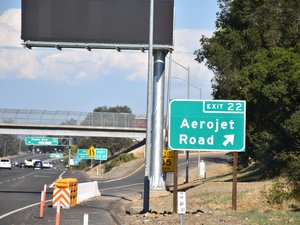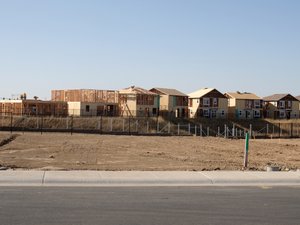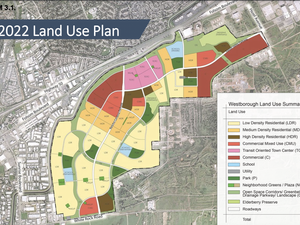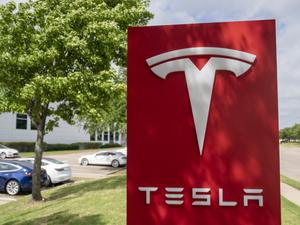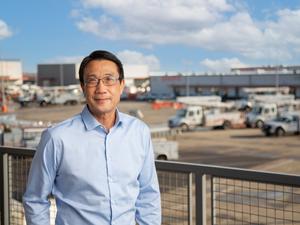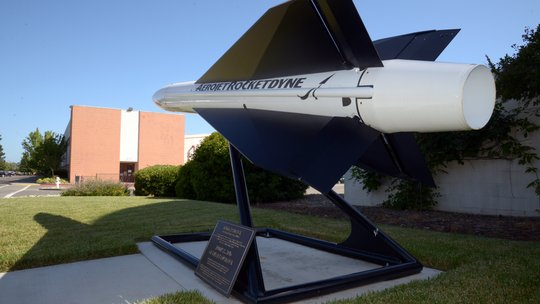
A startup making batteries for electric vehicles is looking at moving into the vacant buildings at Aerojet Rocketdyne’s former headquarters campus in Rancho Cordova.
Eventually, Livermore-based Sparkz Inc. hopes to build 1.5 million square feet of office and manufacturing space at the 60-acre former aerospace site, CEO Sanjiv Malhotra confirmed to the Business Journal Wednesday. The company plans to lease the property, under an agreement that includes an option to purchase it. Sparkz has signed a letter of intent, and plans to close on the lease-to-purchase agreement in the coming weeks.
Ultimately, Malhotra said Sparkz plans to have 1,100 employees working out of the site, and invest up to $1 billion in bringing the facility fully online.
“This is going to be Sparkz’s main facility in the United States,” Malhotra said.
Sparkz will be taking four of Aerojet’s former buildings, and some empty land where Sparkz can expand in the future.
"These are very sturdy buildings, given that Aerojet had been doing some hardcore manufacturing," Malhotra said. "The buildings satisfied a lot of our needs in terms of being very robust structures."
The missile and rocket propulsion company Aerojet was based in Rancho Cordova until 2016, when it announced plans to move its headquarters to El Segundo. At the time, it was the largest publicly traded company based in the Sacramento region, with about 1,600 employees here. Since then, Aerojet has also moved manufacturing operations to other parts of the country. Aerojet was ultimately acquired by Melbourne, Florida-based L3Harris Technologies Inc. (NYSE: LHX) in a deal that was completed in July.
As Aerojet has moved operations out of the Sacramento area, the future of its former headquarters, as well as many of the thousands of acres of nearby land it owned and used for testing rockets, has been unclear. L3Harris representatives declined to comment on the potential new tenant.
“We lost a rocket-maker and replaced it with a company that’s going to help save the planet," said Barry Broome, CEO of the Greater Sacramento Economic Council. "It’s a nice pivot."
Broome said GSEC has been working with Sparkz for a few years to bring the company to the Sacramento region.
“Obviously, we were thrilled that they were taking down that much space,” Broome said.
He said the Sparkz facility will replace the high-paying jobs that were lost when Aerojet left, and also help build the region’s reputation as a zero-emissions vehicle hub.
“Now it has a chance to be a catalyst for changing the economy, and it has a chance to be a catalyst for changing the environment, too,” Broome said.
He acknowledged, however, that Sparkz's plans are high-risk, given the high upfront capital costs of building a facility like the one Sparkz wants to develop.
“These things can become Tesla, or they can become a bloody nose,” he said.
But, he thinks Sparkz has the credentials to see it through.
“It’s a big bet, but a good bet that there’s a big chance that they will be wildly successful,” Broome said.
Malhotra said Sparkz plans to start pilot-scale production out of the facility next year.
It's starting off by building a workforce development center in an existing 50,000-square-foot space, with classrooms and an actual production line.
“We’ve set up a very detailed workforce training protocol,” Malhotra said.
Scale production could start for manufacturing the battery material components in 2025. By 2026, the company plans to scale up manufacturing of the power cells as well. Eventually, the facility will produce full, completed batteries.
“We’re moving very quickly,” Malhotra said.
Currently, the U.S. relies heavily on material components from Asia to make EV batteries.
“This will be the first factory in the United States making the material,” Malhotra said.
He said the material components make up almost 80% of the cost of the batteries, and making them in the U.S., without costly cobalt, will reduce the cost of the batteries, as well as allow auto parts manufacturers to collect higher tax credits for domestic production. Sparkz's innovation is the development of lithium batteries without cobalt. Cobalt-free batteries are considered the next generation of EV batteries. Tesla Inc. (Nasdaq: TSLA) is already making some of its cars with cobalt-free batteries, and other major automakers are looking at following suit.
“This is going to help auto OEMs to be very competitive on the mass market,” Malhotra said.
Malhotra founded Sparkz in 2019, after leaving the U.S. Department of Energy, where he served as the inaugural director of the Clean Energy Investment Center. The company incubated in Tennessee and partnered early on with Oak Ridge National Laboratory in Tennessee on research and later licensed its technologies to produce lithium-ion batteries made without cobalt, that can be used in zero-emissions vehicles and for grid storage.
Last year, it opened its headquarters and pilot facility in Livermore, after getting support from the California Energy Commission. In total, Sparkz has received more than $15 million in grants from the CEC. Last year, it won a $5 million grant from the Governor’s Office of Business and Economic Development’s California Competes program for a full-scale facility. Although the CalCompetes program usually gives awards in the form of tax credits, last year it began giving grants to pre-revenue startups and other companies that wouldn't benefit from a tax credit. This year, the CalCompetes program is intending to give Sparkz a $11.2 million grant.
“The state of California has been very favorable to Sparkz,” Malhotra said.
He said the Sacramento region was also welcoming while the company was looking for a site for its full-scale plant.
“Our requirements were plentiful,” he said. “We need a lot of power, and we must have a sufficient amount of water, and we must have a building that was already built because that shortens the path to starting manufacturing.”
The Rancho Cordova site had all that, Malhotra said, and access to light rail, and a plentiful supply of skilled workers from before Aerojet's local manufacturing shut down.
“The city of Rancho Cordova, Sacramento County, folks from SMUD have all welcomed us with open arms,” he said.
